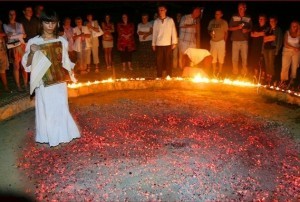Thursday, May 21, may feel as though half of Greece is celebrating because everyone knows a Constantine (Costas, Costis, Dinos) or Helen (Eleni, Elena, Konstantina, Dina, Lena etc) whose feast day it is on Thursday.
The celebration is in honor of Constantine, the first Christian emperor, the son of Constantine and Helen Chloros, born in 272 in the Dardanelles. When his father died in 306 A.D. he inherited the throne of the Eastern Roman Empire. By 312, he had defeated the armies of Maxentios and Maximinos in Italy and was proclaimed emperor of the West also.
His reign was especially cheerful for Christians as persecusions stopped. He transferred his throne from Rome and founded Constantinople, where the present-day Istanbul is located. He died in Venice on May 21, 337.
St. Helen his mother influenced him the most and spent her life in prayer. She is particularly noted for her excavation of the cross on which Jesus Christ had been crucified.
There are a number of superstitions associated with this feast day:
The chief custom is that of Anastenaria, a fire-walking ritual performed on the eve of Saint Constantine and Helen’s Day (May 20). The festival lasts for three days and includes processions, music and dancing with the highlight being the firewalking ritual where participants, carrying icons of saints Constantine and Helen dance ecstatically for hours before entering the fire and walking barefoot over the glowing-red coals but remaining unharmed!
Other customs:
In Thrace, it is believed that St. Helen protects the crops from hail by holding it in Her sleeve so fairs, singing and dancing are held around the region.
In Rhodes, the betrothal of trees takes place so that these could bear more fruit. Sprigs of oleander are placed on the branches of fig and pomegranate trees to ensure that they take root.
On other islands, such as Limnos and Lesvos, people hide on this day. They don’t leave their homes and keep their animals in the shade for fear that they may be marked.
In Lesvos and on other islands, children swear by St. Constantine.





